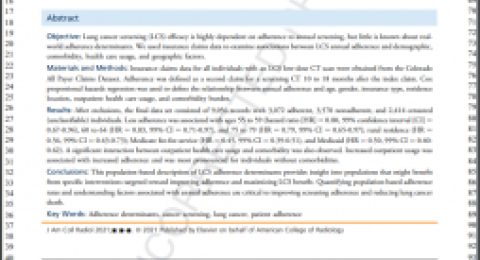
Contact: Stephen P. Malkoski
Email: Stephen.Malkoski@cuanschutz.edu
This investigation was undertaken to assess links between lung cancer screening (LCS) annual adherence and demographic, comorbidity, health care usage, and geographic factors, by using insurance claims data. The Colorado All Payer Claims Dataset was used to acquire insurance claims data for all people with an LCS low-dose CT scan. Ages 55 to 59, 60 to 64, and 75 to 79; rural residence; Medicare fee-for-service, and Medicaid, all were identified to be related to less adherence.
Experts found a significant interaction between outpatient health care usage and comorbidity. Increased outpatient usage demonstrated a link with increased adherence and was found to be most pronounced for people not suffering from comorbidities. This population-based report of LCS adherence determinants has offered better understanding of candidates for whom specific interventions might be beneficial that are targeted toward improving adherence and maximizing LCS advantage. Critical steps to improve screening adherence and decrease lung cancer death include quantifying population-based adherence rates and understanding factors related to annual adherence.
